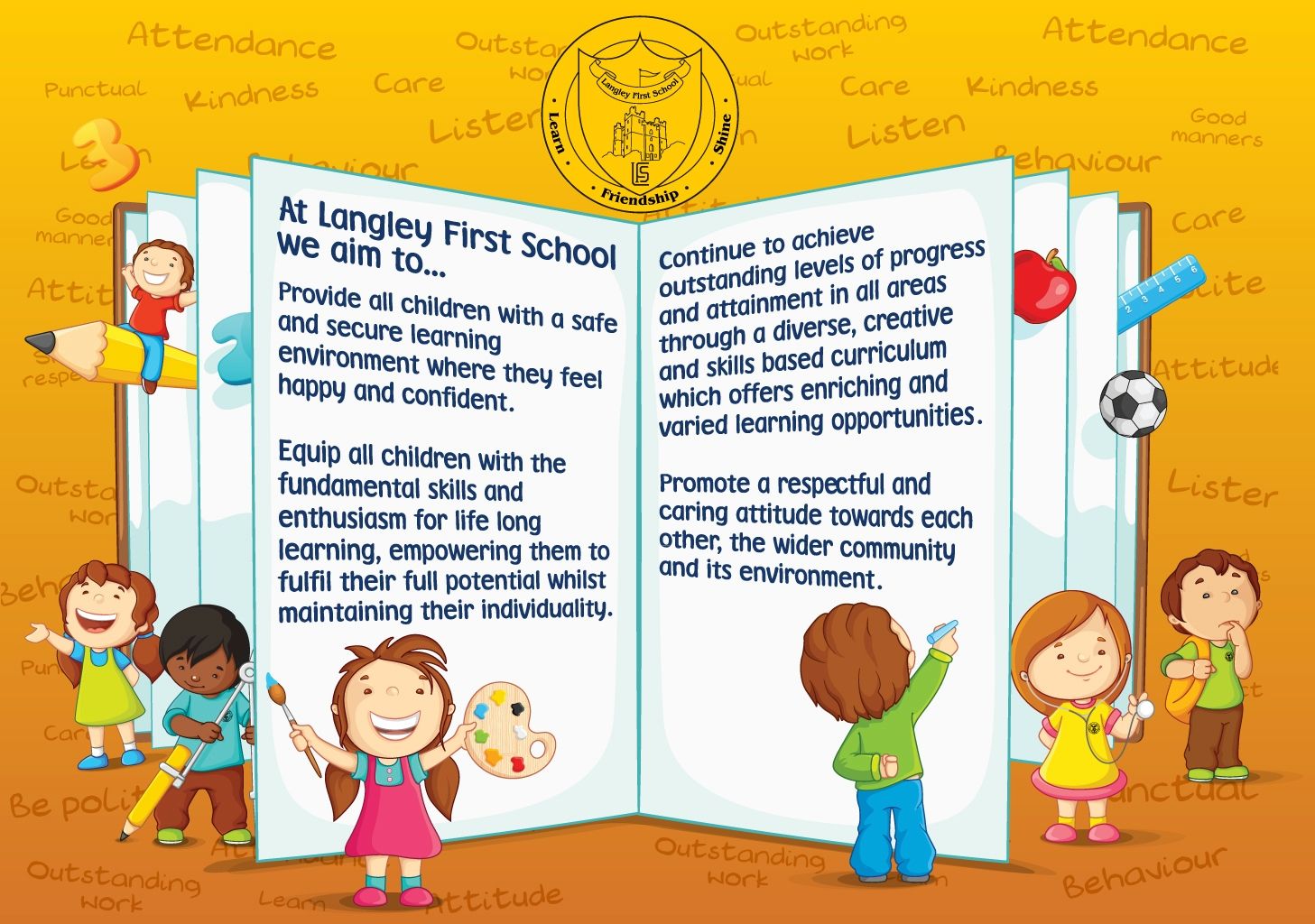Teaching and Learning Policy
Through our school aims, we endeavour to provide the children with the necessary skills, knowledge and understanding to make informed choices about the important things in their lives. The Teaching and Learning Policy will contribute to, and reflect, the overall school aims. It encompasses the curriculum to which children at Langley First School are entitled. At this school we believe in the concept of lifelong learning and the idea that both adults and children learn new things every day. We maintain that learning should be a rewarding and enjoyable experience for everyone. We believe that appropriate teaching and learning experiences help children to lead happy and rewarding lives.
Langley First School aims to:

We believe
- Quality learning is a result of quality first teaching, which is itself informed by regular assessment and oral and written feedback.
- Quality learning is enhanced by a variety of teaching styles and strategies.
- In promoting the value of learning.
- That to learn children must be involved in their own learning and understand what they need to do to improve.
- All staff must have high expectations of children in terms of their learning.
- All children should be encouraged to develop enquiring minds.
- They are curious, interested learners who seek out and use new information to develop, consolidate and deepen their knowledge, understanding and skills.
- Children should be encouraged by all staff to become increasingly independent learners.
- Parents and carers have a crucial and constructive role to play in developing their children’s learning.
Ethos
At Langley First School we endeavour to create a positive context for learning by:
- Fostering a caring and considerate environment where all children feel safe, valued and respected.
- Providing good role models through the way that we interact with all adults and children, at all times, and in all places.
- Creating an environment where it is acceptable to make mistakes and be challenged by their learning.
- Involving all pupils in the way the school is run, through class and school councils, in order to make them feel that their opinion is valued.
- Promoting democracy and British values
- Providing exciting opportunities for learning, which enrich the curriculum and include after-school activities, visits and input from the wider community.
Environment
The environment the children work in plays a crucial role in the way they learn. We strive to provide a stimulating environment conducive to learning.
This is achieved by:
- Creating defined areas in classrooms.
- Organising environments which set an example for children.
- Creating classroom environments that embody a range of displays that are bright , stimulating and celebrate children’s work, as well as promoting learning.
- Providing drinking water in all classrooms, promoting nutritious school dinners and encouraging healthy snacks at playtime in order to contribute towards good physical and mental health.
Classroom Management
All staff at Langley First School make a special effort to establish good working relationships with all children in the class. We treat the children with kindness and respect. We treat them fairly and give them equal opportunity to take part in class
activities. All our staff follow the school behaviour policy and procedures. We acknowledge that well managed classrooms are characterised by a range of other features, which we strive to achieve:
- There are established daily routines and ways of working e.g. register, lining up, tidying away and wet playtimes.
- Children are given a sense of responsibility.
- Resources are well maintained and appropriate to the task.
- Teachers and non-teaching staff are prepared for lessons, including the organisation and preparation of teaching aids / resources.
Pupil Management
- All adults take responsibility for maintaining standards of behaviour for all children in the school community.
- All adults are expected to insist upon and maintain high levels of good behaviour when moving around the school, in the school hall and in the playground e.g. assembly time, lining up on the playground and walking into the school.
- The school standards of behaviour should be maintained when on educational visits / activities.
Effective Teaching and Learning
When teaching, we focus on motivating the children and building on their skills, knowledge and understanding of the curriculum. We base our teaching on the principles of quality first teaching. Our prime focus is to develop further the knowledge and skills of the children. We strive to ensure that all tasks set are appropriate to each child’s level of ability. When planning work for children with special educational needs, we give due regard to information and targets contained in the children’s EHCP and Personal Provision Maps. We have high expectations of all children, and we believe that their work should be of the highest possible standard. We plan our lessons using learning objectives from the National Curriculum / Foundation Stage Profile. Intended learning outcomes and the success criteria are communicated clearly and in an age appropriate way. Through planning we offer opportunities for children to learn in different ways.
These include:
- investigation and problem solving
- research and finding out
- group work
- paired work
- independent work
- whole class work
- asking and answering questions
- use of the computer
- fieldwork and visits to places of educational interest
- creative activities
- debates, role-plays and oral presentations
- designing and making things
- participation in athletic or physical activity;
- through visitors who can enrich the curriculum.
We acknowledge children learn in many different ways and we recognise the need to develop strategies that allow all children to learn in the way best suited to them:
Visual
Auditory / orally
Kinaesthetically
Therefore, we endeavour to take account of these different learning styles when planning and teaching. We actively involve children in the learning process and encourage them to develop self-assessment skills, so that they can take greater responsibility for their learning. All staff follow the school's assessment and marking and feedback policies. Effective marking and verbal feedback provides an invaluable guidance on how well children are doing and what they need to do in order to improve.
Review
The policy will be reviewed in line with priorities stated in the school’s Improvement Plan.




